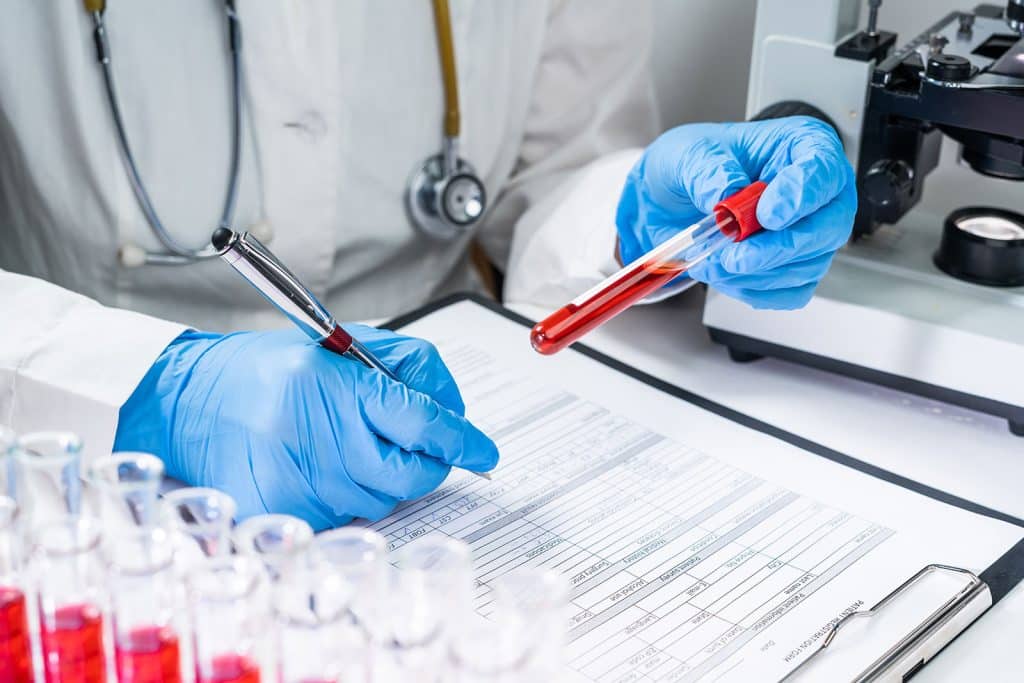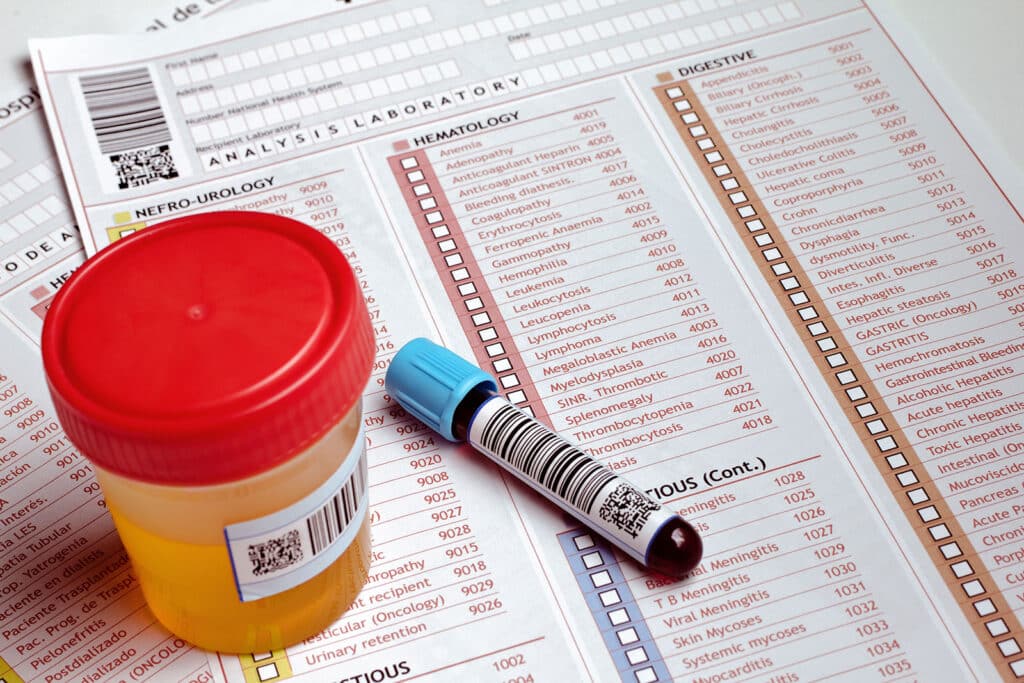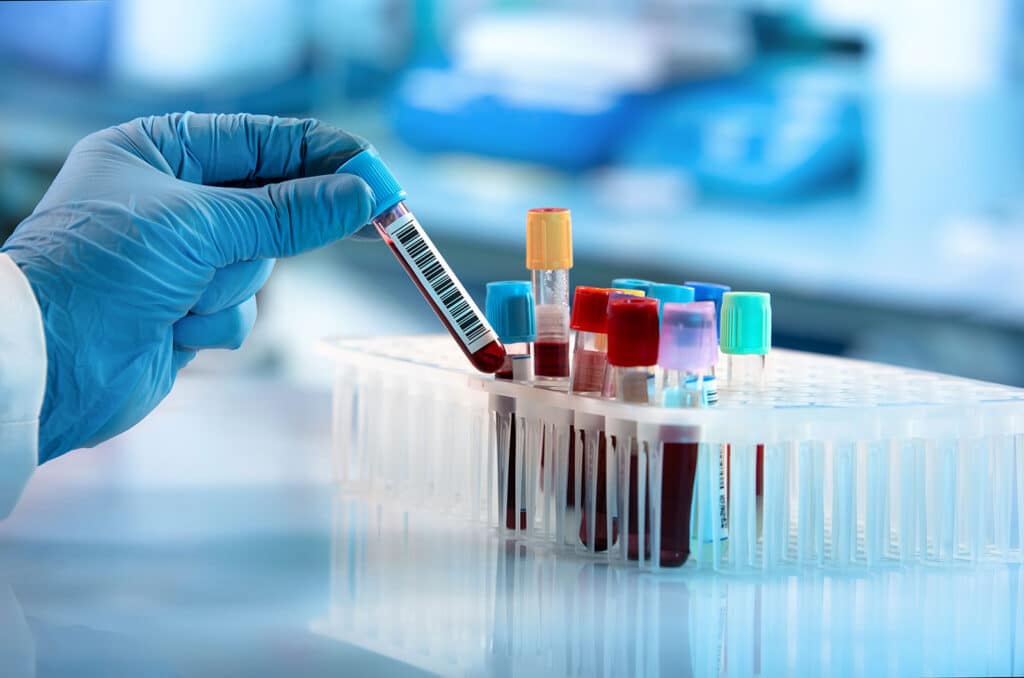Blood tests for alcohol and prescription drugs are not “yes or no” responses but rather a measurement of the amount present.
We all have blood work done from time to time. In some cases, it’s to monitor health conditions like diabetes and high cholesterol. In others, it may be required by your workplace to monitor for alcohol or illicit substances.

If you have blood test results coming up soon, you may have concerns about what they may reveal. Let’s review some of those issues.
Table of Contents
What Do Blood Tests Look For?
Blood tests are used to assess various aspects of your health, but routine blood work does not typically screen for drugs or alcohol. Standard blood panels include:
Common Blood Panels
- Complete Blood Count (CBC) – Measures red and white blood cells, hemoglobin, hematocrit, and platelets.
- Comprehensive Metabolic Panel (CMP) – Evaluates kidney and liver function, electrolytes, and blood glucose levels.
- Basic Metabolic Panel (BMP) – Similar to CMP but without liver function tests.
- Lipid Panel – Checks cholesterol levels, including LDL (bad cholesterol), HDL (good cholesterol), and triglycerides.
- Liver Function Tests (LFTs) – Measures enzymes and proteins that indicate liver health.
- Thyroid Panel – Evaluates thyroid hormone levels (TSH, T3, and T4).
- Iron Panel – Assesses iron levels to diagnose anemia or other conditions.
- Inflammatory Markers – Includes CRP (C-reactive protein) and ESR (erythrocyte sedimentation rate) to detect inflammation.
Blood Tests That Detect Drugs or Alcohol
- Toxicology Screen (Drug Test) – Specifically detects the presence of drugs like opioids, cocaine, marijuana, amphetamines, and benzodiazepines.
- Blood Alcohol Test (BAC Test) – Measures alcohol concentration in the bloodstream.
When Might Drug or Alcohol Testing Be Performed?
- If a doctor suspects substance use based on symptoms (e.g., liver issues, heart irregularities).
- As part of emergency medical care to guide treatment.
- Employment screenings in industries with high liability (e.g., transportation, healthcare, law enforcement).
- Court-ordered or legal testing for DUI cases or probation compliance.
Key Takeaway: Unless specifically requested, routine blood tests do not check for drugs or alcohol. If drug or alcohol screening is needed, a separate test must be ordered.

Drug Test Detection Times
| Drug | Blood Detection Time | Urine Detection Time | Hair Follicle Detection Time | Saliva Detection Time |
| Alcohol | Up to 12 hours | 12-24 hours | Up to 90 days | 6-12 hours |
| Cannabis (THC) | Up to 7 days (chronic use); 1-2 days (occasional use) | 3-30 days (depending on frequency of use) | Up to 90 days | 1-3 days |
| Cannabinoids | Up to 7 days | Up to 30 days | Up to 90 days | 1-3 days |
| Cocaine | Up to 2 days | 2-4 days | Up to 90 days | 1-2 days |
| Opiates | Up to 6 hours | 2-3 days | Up to 90 days | 1 hour to 24 hours |
| Methadone | Up to 24 hours | Up to 7 days | Up to 90 days | 1-2 days |
| Codeine | Up to 12 hours | 1-3 days | Up to 90 days | 1-2 days |
| Hydrocodone | Up to 24 hours | 2-4 days | Up to 90 days | 1-2 days |
| Oxycodone | Up to 24 hours | 2-4 days | Up to 90 days | 1-2 days |
| Methamphetamine | Up to 3 days | 3-5 days | Up to 90 days | 1-3 days |
| MDMA (Ecstasy) | Up to 2 days | 1-3 days | Up to 90 days | 1-2 days |
| Stimulants | Up to 2 days | 1-3 days | Up to 90 days | 1-2 days |
| Phencyclidine (PCP) | Up to 3 days | 7-14 days | Up to 90 days | 1-3 days |
| LSD | Up to 12 hours | 8 hours to 3 days | Up to 3 days (not commonly detected in hair) | 1-3 days |
| Barbiturates | Up to 3 days | 2-4 days (short-acting); Up to 3 weeks (long-acting) | Up to 90 days | 1-3 days |
How Sensitive Are the Tests?
Drug tests detect specific substances or their metabolites in the body, with results interpreted based on established cutoff levels. These cutoff levels are the minimum concentrations required for a test to be reported as positive. The amount of drug use necessary to trigger a positive result varies depending on the substance, frequency of use, individual metabolism, and the type of test administered.
Below is a table outlining common drugs, their standard urine test cutoff levels, and general estimates of usage that may result in a positive test:
| Drug | Urine Test Cutoff Level (ng/mL) | Approximate Detection Window | Usage to Trigger Positive Result |
| Marijuana (THC) | 50 | Occasional use: 1-3 days; Chronic use: up to 30 days | Occasional users may test positive within 1-3 days; heavy users up to 30 days |
| Cocaine | 150 | 2-4 days | Single use detectable for 2-4 days; chronic use may extend detection |
| Opiates | 2000 | 2-3 days | Typical use detectable for 2-3 days; frequent use may prolong detection |
| Amphetamines | 500 | 1-3 days | Detectable for 1-3 days; chronic use may extend detection |
| Benzodiazepines | 200-300 | Short-acting: 1-2 days; Long-acting: 1-2 weeks | Short-acting detectable for 1-2 days; long-acting up to 1-2 weeks |
Important Considerations:
- Individual Variability: Metabolism, body mass, age, hydration level, and overall health can influence detection times.
- Test Sensitivity: Different testing methods (urine, blood, hair, saliva) have varying detection windows and sensitivity levels.
- Cutoff Levels: Established to minimize false positives and indicate recent or significant use.
It’s essential to understand that these are general guidelines. Individual experiences may vary, and specific circumstances can affect test outcomes.

How Could It Affect My Job and My Family?
Our choices in life always carry consequences. Sometimes they’re good, and sometimes they’re bad. Sometimes they’re mixed. It is important to remember that your sobriety is the most important thing in your life. If a blood test detects alcohol or drugs in your blood, it might be best for you in the long run, even if the immediate consequences seem difficult.
Escaping the consequences of addiction and abuse does nothing to correct the problem. It only gives you the opportunity to continue to use, potentially creating far more serious problems than job loss or strained relationships. Instead of keeping it hidden, getting it out into the open, whether through a blood test or by proactively seeking help, makes it impossible for you to hide the issue and creates a path for you to regain control of your future before it’s too late. This path might begin with a difficult conversation, but it’s a conversation that can save your life.
Legal Implications
The legal ramifications of a positive blood drug test vary significantly depending on the context. For employment, laws differ by state and industry. Some jobs, especially those involving public safety, have strict zero-tolerance policies. In legal cases (e.g., DUI, child custody), a positive test can have serious consequences. Probation or parole often includes drug testing as a condition. It’s crucial to understand the specific laws and regulations that apply to your situation. Consulting with an attorney specializing in employment law or criminal defense is recommended if you have concerns about legal repercussions.
Confidentiality (HIPAA)
In medical settings, your blood test results are protected by the Health Insurance Portability and Accountability Act (HIPAA) in the United States. This means your healthcare providers cannot share your results with your employer or family without your consent, except in very limited circumstances (e.g., if required by law). However, if the test is administered by your employer or another third party (e.g., for legal reasons), HIPAA may not apply, and the confidentiality of your results will depend on the policies of that organization and relevant state or local laws.
False Positives/Negatives
While blood tests are generally considered accurate, false positives and false negatives can occur. A false positive means the test indicates drug use when you haven’t used drugs. This can be caused by certain medications, foods, or lab errors. A false negative means the test doesn’t detect drugs even though you have used them. This can happen if the drug level is below the detection threshold or if the test is administered too soon after use. If you receive a positive result, especially if you believe it’s a false positive, you have the right to request a confirmation test using a different method (e.g., gas chromatography-mass spectrometry or GC-MS), which is more specific.
Worried About What Might Show Up in a Blood Test?
If you’re using substances and unsure how it could affect your health, job, or future—we’re here to help. Our team offers confidential, judgment-free support to help you take control.
(855) 340-0802Real answers. Real support. No pressure.

Should I Be Worried?
Let’s start by being very direct: Blood testing tends to be more invasive and expensive than other types of illicit drug screenings, so it is not commonly used for routine workplace drug testing. They’re typically administered in a healthcare setting, such as a hospital or medical clinic, or for specific legal or forensic purposes.
If you have been abusing alcohol or illegal drugs, there is a chance that your blood test will reveal your secret, and this could endanger your employment or your relationships with your family and friends.
This may sound like a worst-case scenario, but we want you to keep some perspective here. A worst-case scenario is going to work impaired and causing an accident that injures a co-worker. A worst-case scenario is running through every financial asset you have, feeding your addiction until you are living on the streets. A worst-case scenario is resorting to drug dealing, theft, or prostitution to get your next fix.
A worst-case scenario is dying from your addiction.
Should you be worried about the results of a blood test? Yes, but you should probably be more worried about a “lucky” negative test that does nothing to help you begin addressing your addiction. A negative test doesn’t mean you don’t have a problem.
Focus on Addiction Treatment
If you’re concerned about a blood test, it’s likely a sign that you’re worried about your substance use. Instead of focusing solely on the test, consider this an opportunity to honestly assess your relationship with drugs and alcohol. Regardless of the results, seeking professional help for addiction is a sign of strength, not weakness. Treatment can provide you with the tools and support you need to overcome addiction and build a healthier, happier future. Don’t wait for a crisis or a positive test to take the first step. There are many resources available, including therapists, support groups, and treatment centers. Your health and well-being are worth it.
Of course, a blood test that reveals only that you drink in moderation or have used prescription drugs appropriately is not an issue, assuming that you haven’t consumed at a time when you shouldn’t have, such as during work hours.
It is very important to understand that blood tests for alcohol and prescription drugs are not “yes or no” responses but rather a measurement of the amount present. If you had a glass of wine late last night and had a blood test this morning, there won’t be a problem because the test will show a very low level of alcohol. If you took your prescription muscle relaxer before bed and got tested the next afternoon, the result will show a therapeutic level of the medication, not a level high enough to be considered abuse.
Any level of illegal substances like cocaine or heroin is a problem, but positive blood tests for alcohol or medication prescribed for you will be a matter of quantity and context.

Where Can I Go for Help?
If you have a problem with alcohol or drugs, seek help. Whether a blood test reveals the problem or not, it’s still there. You need expert involvement to deal with your problem and create a healthy future for yourself and your family.
Garden State Treatment Center should be your first call. Our experienced team has helped hundreds of people struggling with addiction to free themselves from their substance problems and regain control of their lives.
If the possibility of a positive blood test worries you, that’s a sign that you should be working on getting clean. From outpatient treatment to detoxification and inpatient care, Garden State Treatment Center can be just the solution you need. Call today us today to find out how we can help.
Published on: 2022-12-24
Updated on: 2025-06-09



